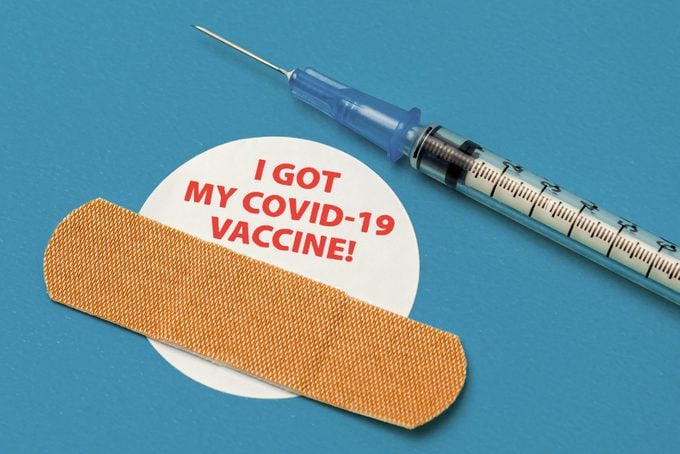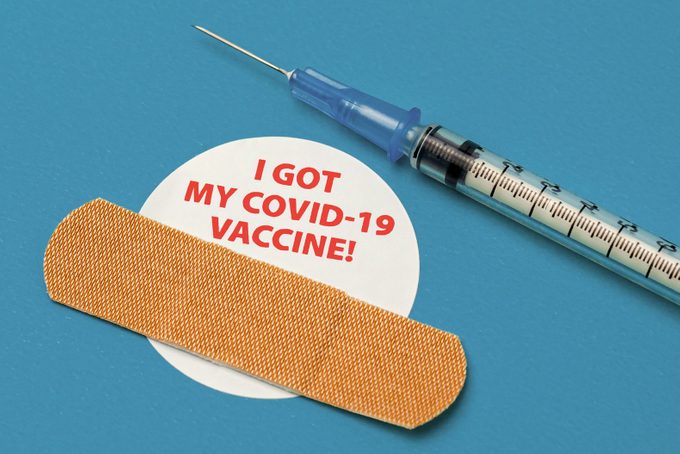A rise in vaccinations
Covid-19 vaccinations continue to roll along in the United States with more than one-fifth of the population fully vaccinated and millions more joining them every day, according to the Centers for Disease Control and Prevention (CDC).
Some people are still hesitant to get the jab but even that number is dwindling, according to a Kaiser Health News poll. That will help us reach herd immunity where enough people have immunity to the disease that it will no longer spread easily.
If you’ve already received your shot can you take the Covid-19 shackles off? After all, all of the vaccines are very effective in preventing Covid-19, especially severe illness.
The answer is not just yet. The door to the world is ajar for the first time in more than a year, but it’s not yet wide open.
“Individuals still need to be cautious for their own sake because the vaccines are not 100 percent effective,” says Scott Weisenberg, MD, an infectious disease physician and director of the travel medicine program at NYU Langone Health in New York City. And you don’t want to put anyone else at risk.
Learn what you can and cannot do once you’re fully vaccinated, and what this actually means.
What to do right after the vaccine
Immunity from vaccines ramps up gradually. Right after getting a shot, nothing changes, says Katherine L. Baumgarten, MD, medical director of infection control and prevention at Ochsner Health in New Orleans.
However, there are some steps you can take in the hours and days after the shot to help the vaccine come up to speed.
Robert Glatter, MD, an emergency physician with Lenox Hill Hospital advises staying hydrated and resting immediately after the jab. Also, don’t leave the vaccination site and go directly to the gym.
“Heavy or intense exercise immediately after the vaccination can reduce your body’s ability to mount an effective immune response,” Dr. Glatter adds.
Finally, don’t book any other vaccines until at least two weeks after your Covid-19 vaccine. “Doing so before could reduce your body’s ability to generate adequate antibodies post-vaccination,” he adds.
What does “fully vaccinated” mean?
Both the Pfizer and Moderna vaccines are about 95 percent effective in preventing illness after two doses, set three and four weeks apart respectively.
That means you won’t be fully protected until two weeks after the second dose.
Experts generally feel you’ll be about 50 percent protected two weeks after the first dose.
The Johnson & Johnson vaccine, which uses a different technology, only requires one dose so your immune system will be fully up to speed two weeks later.
In trials, that vaccine was 74.4 percent effective overall in the United States overall and 100 percent effective in preventing hospitalizations and deaths.
Nearly 7 million people in the U.S. have received the Johnson & Johnson vaccine, but it’s paused at the moment while investigators look into a risk of rare blood clots potentially linked to the vaccine.
Can you still transmit the virus after getting vaccinated?
When the different Covid-19 vaccines were approved, research found that they prevented symptomatic Covid but it didn’t prove that the jabs could reduce asymptomatic transmission. We still don’t have a complete answer on this but it seems that transmission is less likely after vaccination.
“We believe that transmission doesn’t occur as widely if have been vaccinated but we don’t have all that information yet,” says Dr. Baumgarten.
We also don’t know how long antibodies from the vaccine last but interim results from a Phase 3 study, published in The New England Journal of Medicine found that those from the Moderna vaccine persisted at least six months.
A major study from the database UK Biobank in January found that antibodies from actually being infected with SARS-CoV-2, the virus that causes Covid-19, last at least six months in most people.

Can I be around other people?
It depends. You’ll still need to wear a mask most of the time after you’re fully vaccinated but, says Dr. Glatter, “You can be around another household of fully vaccinated people in a private setting without a mask and without social distancing.”
If any of those people are at an elevated risk for severe illness from Covid-19 (for example, they have an underlying condition), however, you need to mask up and stay six feet apart.
You also need to wear a mask and social distance if your gathering becomes larger and/or involves unvaccinated people.
This is for people who fall into one of the groups studied in clinical trials, mainly healthy individuals who were not severely immunocompromised, says Dr. Weisenberg. It’s also still a good idea to stay away from mass gatherings, especially if they are indoors.
Can I travel?
The answers are different depending on whether you’re traveling domestically or internationally.
If you’re fully vaccinated, the CDC says you can now travel within the United States without getting a Covid-19 test before or after you travel, which were the previous recommendations. You also don’t need to self-quarantine after returning.
International travel is more complicated because you need to take into account the regulations in place at your destination. In fact, you may even choose your destination based on what those requirements are. U.S. authorities don’t require that you get tested before you go but some countries require this upon entry.
“Some destinations require a negative test result or proof of immunity,” says Dr. Baumgarten. “It’s a little tricky because they may require certain types of tests or certain locations.”
She recommends checking all this out before you travel. You may also want to consider the variants which are dominant in different parts of the world: Vaccines may not protect against all of them equally. Some destinations may even begin to require a vaccine passport, which is proof that you’ve had the Covid vaccine.
You should still get tested three to five days after returning.
What you still have to do (or not do)
Wear your mask, except at those intimate gatherings with other fully vaccinated people. If you have to be indoors, make sure it is a well-ventilated place and make sure you social distance, recommends Dr. Baumgarten.
Avoid medium-sized and large crowds and avoid visiting with high-risk people who aren’t fully vaccinated. Dr. Weisenberg says dining indoors at restaurants and going to museums will probably be individual choices made with knowledge of the possible consequences.
This may still seem like a lot of restrictions but better times are on the way.
“As more and more of the population gets vaccinated and the amount of virus decreases, low-risk activities will become even lower risk,” says Dr. Weisenberg. Eventually, medium and high-risk activities will be downgraded as well.
The post What Can Vaccinated People Do? The Dos and Don’ts appeared first on The Healthy.







